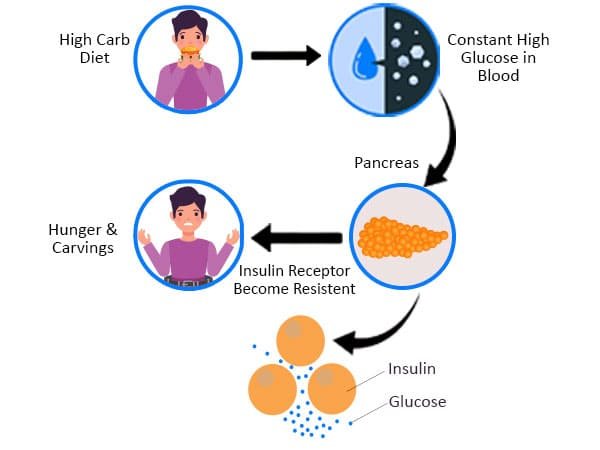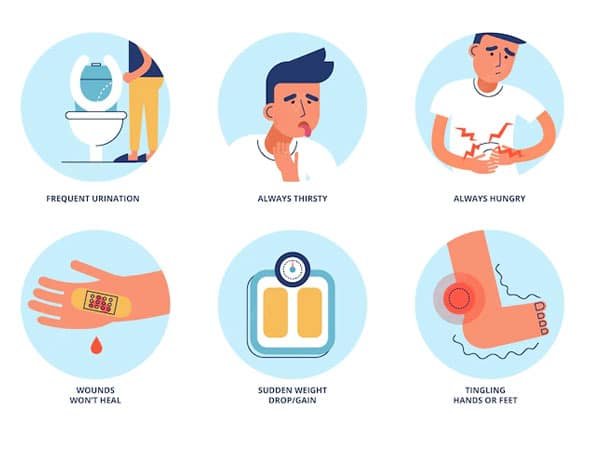
Insulin Resistance: Causes, Symptoms, and Treatments
Insulin resistance is a condition where your body does not respond properly to insulin, a hormone that helps regulate blood sugar levels. This hormone regulates blood sugar levels and helps your body use glucose from food. Beta cells in the pancreas produce insulin. This can lead to diabetes, high cholesterol, heart disease, obesity, and other health problems. Several factors cause insulin resistance including genetics, diet, stress, lack of sleep, and lifestyle choices.
Many factors contribute to IR, including obesity, genetics, stress, medication use, and lack of exercise. However, lifestyle choices such as poor diet and smoking cigarettes can also cause IR.
When insulin is working properly, it allows glucose to enter cells and use them for energy. If insulin is resistant, then glucose cannot get into the cell. This leads to high blood sugar levels. There are many different types of IR, including pre-diabetes and type 2 diabetes.
Pre-Diabetes: Pre-diabetes is a condition where blood sugar levels are higher than normal but we can’t say that the person is diabetic. People who have pre-diabetes may develop full-blown diabetes if they do not make lifestyle changes.
Type 2 Diabetes: IR causes Type 2 Diabetes due to inadequate insulin production. In this case, the pancreas produces less insulin than needed.
Hypertension: High blood pressure can damage your heart and brain. It increases the risk of stroke, kidney disease, heart attack, and other health problems.
Obesity: Obesity is a medical condition where excess fat accumulates around the waistline. Excess weight puts extra stress on joints and muscles. Over time, obesity can lead to serious health issues like heart disease, stroke, sleep apnea, and arthritis.
Cancer: Cancer is a group of diseases that has uncontrolled cell division. Some cancers start in the skin, while others begin in organs or glands. Cancer cells divide rapidly and can invade nearby tissues.
Although IR can happen to anyone from men to women Men are more likely to develop diabetes than women. This is due to their higher body fat percentage and lower muscle mass. Insulin resistance can occur at any age but is most common in middle-aged men who have been overweight for many years.
Women are less likely to develop diabetes than men. However, they are still susceptible to developing insulin resistance if they gain too much weight after menopause. Children are not affected by insulin resistance. They do not need insulin to metabolize sugar.
Read more: Functions of an Insulin Pump – A Brief Introduction to an Insulin pump
What are the symptoms of Insulin resistance?
Symptoms of IR include:
– Fatigue
– Bloating
– Headaches
– Frequent urination
IR can cause many health problems like high blood pressure, diabetes, cardiovascular disease, obesity, and other chronic diseases.

IR occurs when your body does not respond properly to insulin, causing the pancreas to produce higher levels of this hormone than its needs. As a result, the muscle cells absorb glucose instead of fat cells. This can lead to weight gain, high blood sugar levels, fatigue, headaches, and depression.
When it comes to IR, how can you tell if you have it?
The best way to know whether you have insulin resistance is through clinical testing. A simple test can detect the level of insulin in the bloodstream. Your doctor can examine your lab results, then determine how serious the condition is. He or she may recommend further tests to determine if you need to take medications.
Inflammatory hormone disorders that cause IR
The hormones responsible for regulating appetite, satiety, and food intake are leptin and ghrelin. Leptin helps regulate energy intake by signaling to the brain how much fat is in the body. Ghrelin stimulates hunger and induces feelings of reward from eating. A decrease in these hormones can lead to overeating and obesity. Dietary changes and exercise can help raise leptin levels and reduce ghrelin levels. Some studies have shown that dietary changes and exercise may also promote weight loss and increase insulin sensitivity.
The following are some of the genetic conditions that can cause IR:
- Polycystic Ovary Syndrome (PCOS)
- Obesity
- Type 2 Diabetes Mellitus (T2DM)
The three major genetic factors that are known to cause insulin resistance are Polycystic Ovary Syndrome (PCOS), Obesity, and Type 2 Diabetes. These may occur independently or together. PCOS occurs when estrogen levels rise too much and testosterone decreases too low. This leads to excess hair growth, irregular menstruation cycles, acne, infertility, weight gain, and other health issues.
Obesity causes insulin resistance due to the inflammation and stress caused by being overweight. It also creates a cascade effect, where the fat cells become inflamed and release inflammatory molecules that make the insulin less effective.
Finally, type 2 diabetes is caused by the body not responding well to insulin. In addition, the body does not produce enough insulin, or the cells do not respond effectively to insulin. With either one or all of these conditions present, they create a vicious cycle of IR.
What is the best way to diagnose IR?
The first sign of insulin resistance is usually fatigue. You might feel tired even after eating a normal meal. Once you begin to experience these symptoms, your doctor should conduct tests to determine whether you are suffering from IR. These tests include measuring your blood glucose level following fasting, or before breakfast. Different types of blood testing devices measure blood glucose levels. The results of these tests will show either elevated or decreased blood glucose levels.

Blood Sugar Test: This is a simple test where you take your blood sugar level. If you are diabetic, this test may detect early-stage symptoms before you experience any serious health issues. A normal blood sugar level ranges from 70 – 99 mg/dL. Anything over 100 mg/dL could indicate diabetes.
Glucose Tolerance Test: A Glucose tolerance test measures the amount of glucose in your blood after eating a standard meal. Your doctor will give you a certain amount of food to eat and then check your blood sugar levels. People who have increased insulin production usually have higher glucose levels than others.
There are three classes of drugs commonly prescribed to treat IR. They include alpha-glucosidase inhibitors, thiazolidinediones, and incretin mimetics.
Alpha-glucosidases inhibit the digestion of carbohydrates into glucose. Some people take these drugs to control their appetite or manage their blood sugar levels. Thiazolidinediones (or glitazones) are prescribed for patients who cannot use metformin. These drugs improve insulin sensitivity and lower glucose levels. Increases the effect of insulin and helps reduce blood sugars. They are taken orally.
Is it possible to reverse insulin resistance?
Yes! Here’s what you need to do:
- Eat healthy foods that are low in carbohydrates. You should limit your intake of bread, pasta, rice, potatoes, sweets, candy, pies, and other sweet treats. Instead, choose lean protein, vegetables, fruit, and whole grains, including brown rice, oats, quinoa, beans, nuts, and seeds. This will help reduce inflammation in your body and improve insulin sensitivity.
- Exercise regularly. If you don’t already exercise, start slowly. Choose activities like walking, swimming, hiking, and cycling. These types of exercises have a positive effect on blood sugar levels and increase insulin sensitivity.
- Avoid stress. Stress causes cortisol production in our bodies, leading to higher levels of fat storage and IR. Be mindful about how much time you spend watching TV, playing video games, surfing the Internet, and engaging in social media. Try to avoid these things altogether if possible.
- Get enough sleep. Sleep deprivation leads to increased cortisol levels and elevated blood pressure. When you’re tired, you’re more likely to overeat. Make sure to get at least 7-8 hours of quality sleep per night.